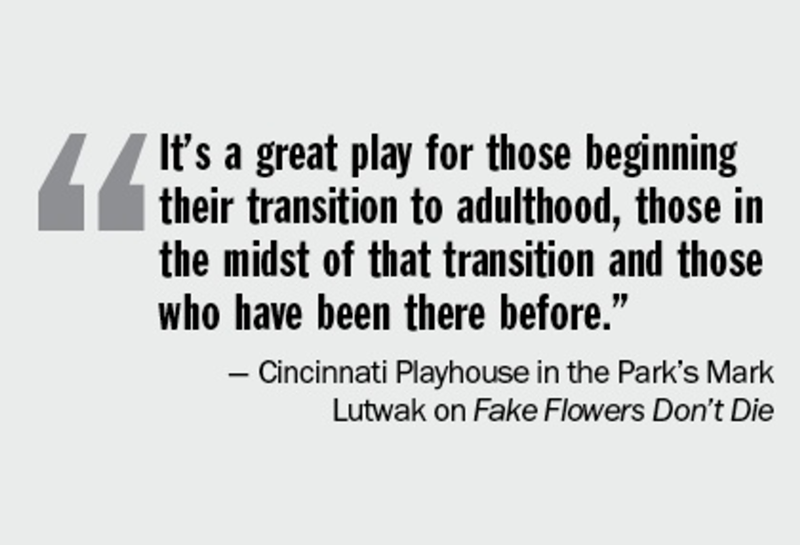When I mention the Cincinnati Playhouse in the Park, you likely think of the theater that sits on the hilltop above Mount Adams. It’s a marvelous asset to our community’s arts scene, the winner of several Tony Awards. It has a noteworthy history of presenting new theatrical works (68 so far). But the folks who run the Playhouse know that new audiences must be continuously cultivated, and for that reason, they deliver performances through a program they call “Off the Hill,” which tours shows for young audiences to community arts centers across the Tristate. (Most are free or very modestly priced.)
In most years, three shows are offered. Currently it’s John Yearley’s Fake Flowers Don’t Die, a world premiere. In mid-October I took in a performance of the hour-long piece performed by four actors when it made an appearance at the Sharonville Fine Arts Center. Designed for kids who are 7 or older, it’s about three students who discover a lamp that they think might grant them three wishes. They consider choices like a pile of money or a winning Cincinnati Reds season. But one has an ill relative, another a sibling with a disability and a third a divorced mom whose new boyfriend is kind of irritating. Their decisions aren’t so easy.
According to Mark Lutwak, the Playhouse’s education director, “It’s a great play for those beginning their transition to adulthood, those in the midst of that transition and those who have been there before. The circumstances are humorous, quirky and ultimately believable.”
I enjoyed the portable production that uses some roll-around banners that suggest simple scenes including a playground, a nearby woods and a basement (with fake flowers). There’s some furniture that transforms from a footstool to a tree stump by whisking off a slipcover. Four actors, members of the Playhouse’s Bruce E. Coyle Intern Company, bring the characters to life. Justin Weaks is Eugene, who finds the lamp, shares a love of Legos and sci-fi with voluble JJ, played by Jon Kovach. Meggy Hai Trang is Barky, JJ’s smart but mildly autistic sister who often embarrasses her brother. Britian Seibert is Anna, Eugene’s spirited new friend (each time she enters she creates a mock explosion), whose grandmother is ill; JJ resents Eugene’s decision to include another person into their circle of friends.
The actors are professionals in training. Kovach, a Miami University grad, is known to local audiences for Nothing, a solo 2012 Fringe show he performed about an autistic teenager. His castmates are from New York City (Trang), Charlotte, N.C., (Weaks) and Chicago (Seibert) and have numerous degrees and credentials. They are delightfully convincing as everyday kids grappling with life’s challenges, offering portraits children in the audience (some younger than 7) as well as the adults can relate to. The script has plenty of humor and contemporary references to make it feel real. Yearley has blended a familiar story with some of his own experiences, hoping to deliver “a rich enough story to be very entertaining while still dealing with important issues about how we live our lives.”
His script won the 12th annual Macy’s New Play Prize, a national competition managed by the Playhouse to create new work for younger audiences. He’s been here before, when his comedy Leap had its world premiere on the Playhouse’s Thompson Shelterhouse stage in 2005.
“I am a huge fan of the work that the recipients of the prize have produced thus far,” Yearley says, “and only hope to keep up the standard of excellence. My previous history with the Playhouse makes my return to Mount Adams that much sweeter.”
Fake Flowers Don’t Die, which has been touring since late September throughout Southwest Ohio and Northern Kentucky, wraps up with 7 p.m. performance at Grove Banquet Hall in Springfield Township on Friday and at the Bi-Okoto Cultural Center in Pleasant Ridge Saturday.
Two more Off the Hill productions are scheduled for the season. Joan the Girl of Arc (Jan. 17-Feb. 22, 2014), designed for ages 11 and up, is another world premiere, this one about the childhood of the young woman who helped save France in the 15th century.
In the spring it’s The Short Tree and the Bird that Could Not Sing (April 11-May 18, 2014), for ages 5 and up, about the ups and downs of friendship between an odd couple, a diminutive tree and a tone-deaf bird.
You’ll find more information about these productions, including performance locations, by clicking the Onstage tab at cincyplay.org.
CONTACT RICK PENDER: [email protected]







